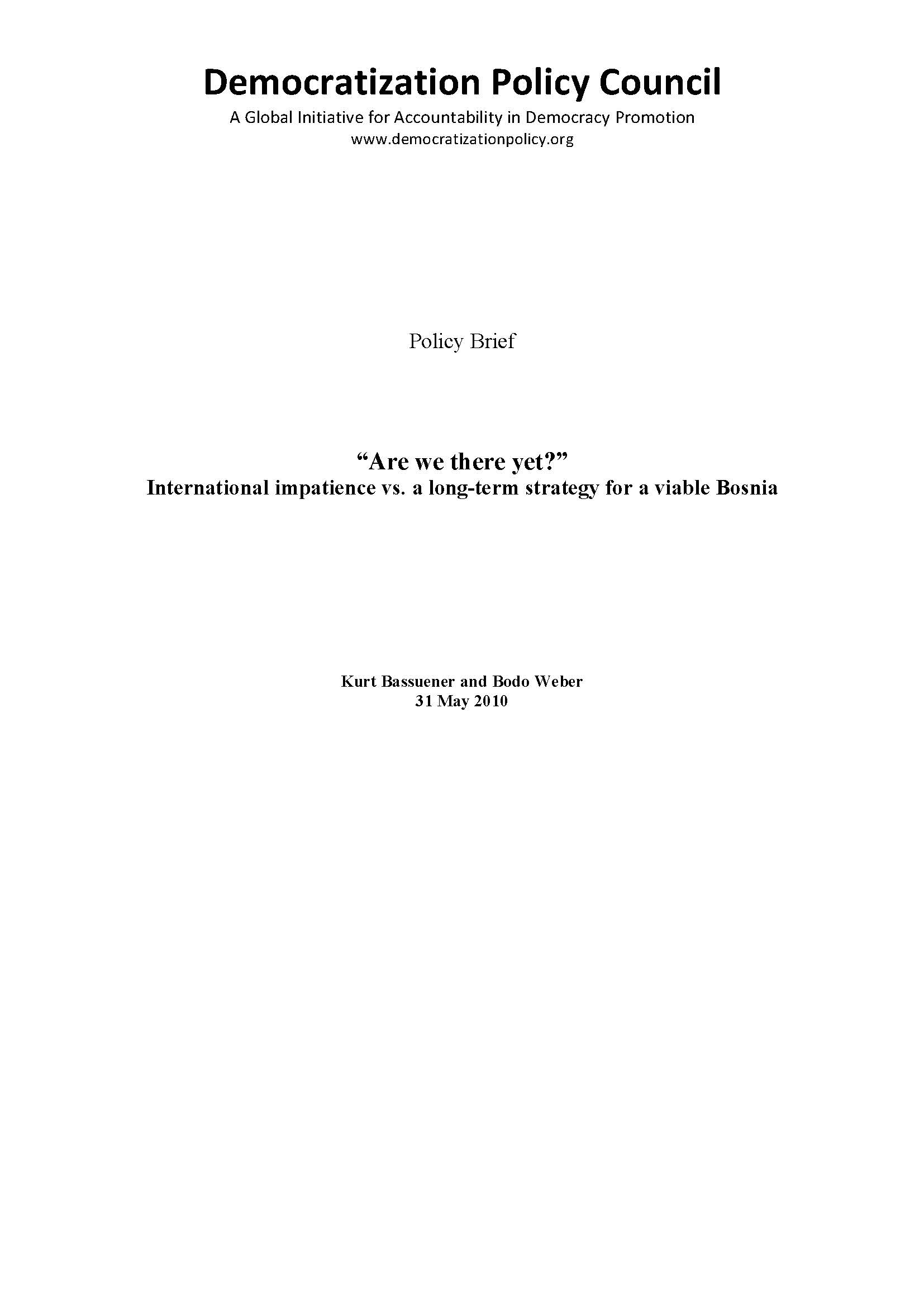№05 “Are we there yet?” International impatience vs. a long-term strategy for a viable Bosnia.
№05 “Are we there yet?” International impatience vs. a long-term strategy for a viable Bosnia.
Author(s): Kurt Bassuener, Bodo Weber
Subject(s): Politics, Governance, Government/Political systems, International relations/trade, EU-Approach / EU-Accession / EU-Development
Published by: DPC Democratization Policy Council e.V.
Keywords: BiH; long-term strategy; international activity; Butmir; visa liberalization; international relations; EU; US; OHR; secession; third entity; election; stabilization;
Summary/Abstract: The international community’s collective approach toward Bosnia and Herzegovina has failed to gain any traction, as it remains based on false assumptions. The governments comprising the Peace Implementation Council’s Steering Board (PIC) have not been able to summon the will to confront the actual challenges Bosnia poses, preferring to operate from the off-the-shelf EU integration playbook. As a result, 2009 saw a further deterioration in the overall political situation. American political credibility in Bosnia was dented by the failed “Butmir process” last October, during and after which the US ceded direction of its policy to the EU. The Obama administration is struggling to devote sufficient attention to Bosnia’s worsening situation and continues to eschew the most plausible tool to deal with a fragmented EU – a presidential special envoy. The collective international posture lurches between frenetic diplomatic activity in search of a short-term deliverable and passivity. This modus operandi has allowed Bosnian political actors with unfulfilled agendas, most prominently Republika Srpska Premier Milorad Dodik, to operate without constraint, even calling the survival of the stateinto question. Policies among PIC members differ, but most are in a passive role, absent any clear leadership. Russia has acted as an enabler for Dodik. Germany has twin pillars of its current Bosnia policy: reducing the international commitment in Bosnia, and fixation on policy coordination with Russia. Turkey, meanwhile, has ramped up its diplomatic engagement since Butmir, with an emphasis on the relationships between Bosnia, Serbia, and Croatia. It is the only member of the PIC that has engaged consistently, and can point to some results. Meanwhile, the Dayton Agreement’s enforcement instruments, the Office of the High Representative and EUFOR, have been allowed to wither due to lack of political will to employ them. The current policy therefore contains a contradiction: the Dayton Annex 4 Constitution is expected to remain for the foreseeable future, but its enforcement mechanisms might disappear in less than a year.As the October general elections approach, the spectrum of possibilities, from improvement to furtherworsening of the situation, is wider than at any point since Dayton was signed. While Dodik seeks to portray himself as electorally invincible, there is evidence to suggest that he has peaked and could face a voter backlash. The Croat political spectrum is divided, while the current rules-free atmosphere has allowed flirtation with the RS to support a “third entity”. The Bosniak political spectrum is more fragmented than ever, with the emergence of new populist political party led by media tycoon Fahrudin Radončić. One of the two tools of choice for Bosnian politicians, patronage, may be constrained by the economic crisis. But the other, fear, is more salient than ever, as the absence of a long-term international strategy has allowed uncertainty about the future to take hold. Recent incidents in Široki Brijeg, Sarajevo, and Tuzla all point to the potential for both planned and spontaneous outbursts of violence. The international default setting remains to talk down any such possibility. Bosnia is suffering a deterrence failure. Little forward movement on the 5+2 objectives and criteria or on constitutional reform is likely between now and the formation of a new government after the elections. However, in the coming months, Western governments can help create the conditions for progress in 2011 and beyond. This will require some policy reversals on both sides of the Atlantic. But these would create a context in which the difficult and broad societal compromises necessary to achieve a self-sustaining democratic Bosnia can be forged.
Series: DEM. POLICY COUNCIL - Policy Briefs
- Page Count: 19
- Publication Year: 2010
- Language: English
- Content File-PDF

